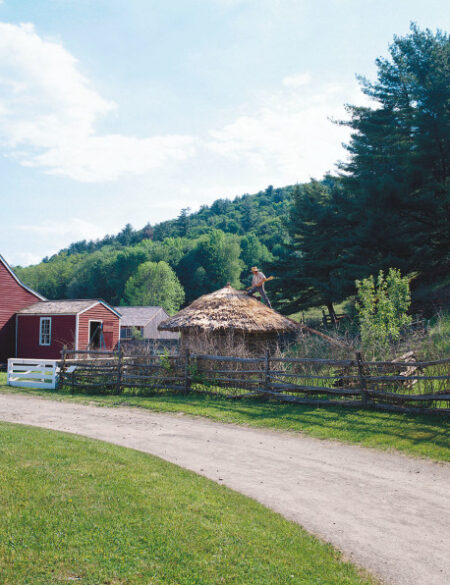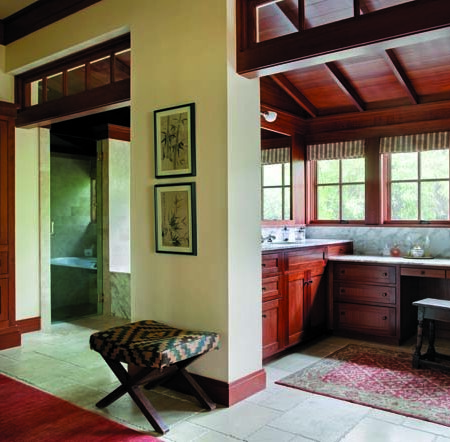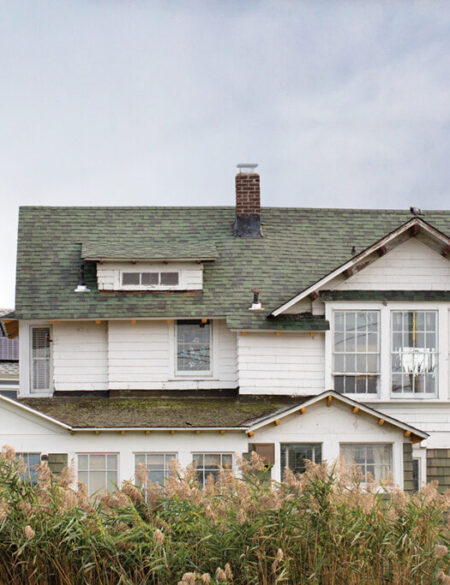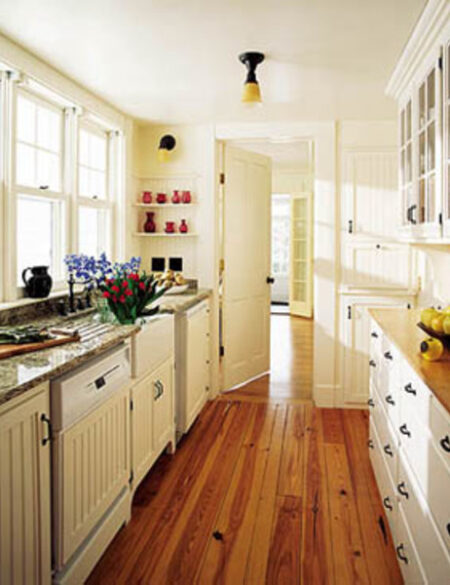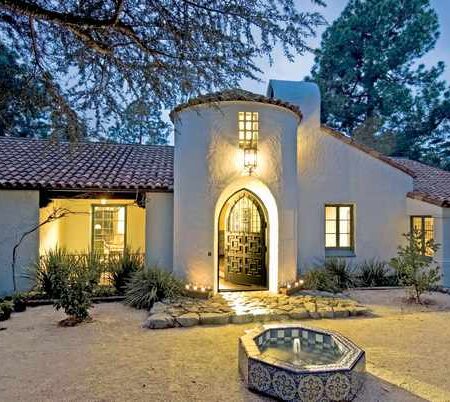This content was originally published on OldHouseOnline.com and has been republished here as part of a merger between our two businesses. All copy is presented here as it originally appeared there.
The Hudson River Valley is steeped in history-Native American, Dutch and Huguenot, English. The area spawned a revered American school of painting and inspired notable people in history to build lovely estates. Autumn brings spectacular foliage color, farm stands, and cider right from the orchard, but all seasons here are beautiful. A leisurely road trip starts just north of New York City-in Tarrytown, perhaps, at the Gothic Revival mansion Lyndhurst-passes through historic New Paltz, and continues north to Albany, the state capital, and beyond, to the river’s source in the Adirondacks.
The private home Schoolfield is in rural Columbia County, which is located in the Upper Hudson Valley on the east side of the river. This area boasts several important house museums. Must-sees:
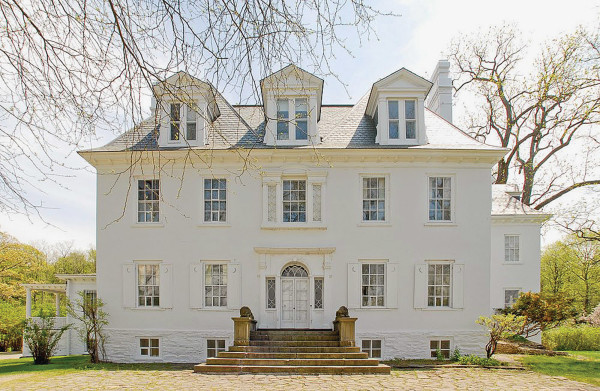
A Colonial Revival remodeling left Clermont closer to its original appearance than during the Victorian era. (Photo: Conrad Hanson)
Clermont Historic Site, Germantown
Built in 1740, burned by the British in 1777, and immediately rebuilt by the prominent Livingston family, the house had further additions over decades, including a Victorian remodeling in 1893. A verandah and porch were later removed and the house remodeled in Colonial Revival mode. Today the interior is preserved as it was in the 1920s, with furnishings inherited through seven generations. Open April-Oct.; four gardens and extensive grounds open year-round. (parks.ny.gov, friendsofclermont.org)
Olana, Hudson
(See photo at the top of the page.)
This is the exotic fantasy home of noted Hudson River School painter Frederic Edwin Church. The high-style Victorian villa was built upon the Church family’s return from an extended tour of the Middle East, and reflects Moorish architecture and ornament. Church collaborated with his friend the architect Calvert Vaux on design of the house and grounds. In 1872, the family moved in, although construction and finishing went on until 1891. Olana is a unique design, but also a unique example of a house married to its landscape, and vice versa. Many tour options, April-Oct. The park-like grounds, open daily year-round, are free to visit. (olana.org)
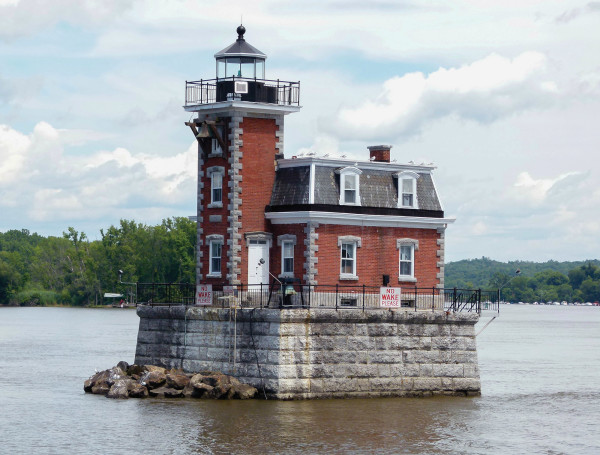 (Photo: Courtesy Wikimedia Commons)
(Photo: Courtesy Wikimedia Commons)Imagine living in the Hudson-Athens Lighthouse!
When you’re in the area, stroll downtown Hudson to see 19th-century homes in the Gothic Revival, Queen Anne, Second Empire, and Neoclassical styles. The town of Hudson is full of galleries, antiques stores, and performing arts venues. Also gaze at (or visit) the Hudson-Athens Lighthouse, which includes the keeper’s Second Empire house, built beginning in 1872. Summer tours out to the island happen on the second Saturdays in the months of July-Oct. hudsonathenslighthouse.org
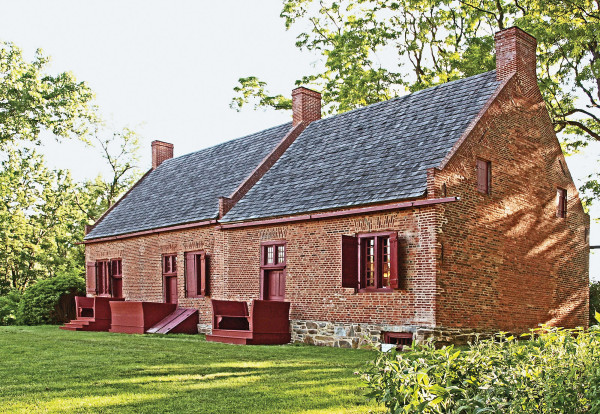 (Photo: Courtesy Wikimedia Commons)
(Photo: Courtesy Wikimedia Commons)In Kinderhook, the Luykas Van Alen House is a Dutch original.
Luykas Van Alen House, Kinderhook
Built in 1737 and later extended, the brick Van Alen House is an authentic example of early Dutch architecture in the region. It’s believed to have been the inspiration for the Van Tassel homestead in Washington Irving’s The Legend of Sleepy Hollow. The interior has been restored to its 18th-century appearance. Open June-Oct. (cchsny.org)
Also in Kinderhook, visit Lindenwald, the Martin Van Buren National Historic Site. The Eighth President purchased the property in 1839 and lived here until 1862. The house was built as a red-brick Georgian-style farmhouse in 1797, and was redesigned as a larger Italian Villa by architect Richard Upjohn in 1849. The interior reflects the Van Buren years. (nps.gov)
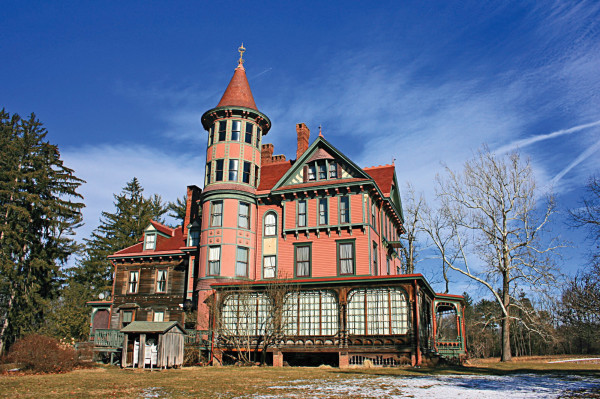 (Photo: Rolf mueller/commons.wikimedia.org)
(Photo: Rolf mueller/commons.wikimedia.org)The Wilderstein Mansion in Dutchess County.
Nearby in Dutchess County
For an extended visit, include this county directly south of Columbia, still on the east bank of the Hudson. Poughkeepsie, 90 miles north of New York City, is the county seat. Historic highlights:
- Wilderstein, Rhinebeck The Victorian-era Thomas Suckley house was the home of FDR cousin and confidante Margaret (Daisy) Suckley. Begun in 1852 as an Italianate country home, the house was enlarged in 1888 to become the elaborate Queen Anne-style mansion we see today. Calvert Vaux laid out the grounds. The fashionable interior shows the late-Victorian predilection for mixing styles, with HistoricalRevival and Aesthetic Movement decoration in different rooms. wilderstein.org
- Locust Grove estate, Poughkeepsie The house is an unusual Italianate mansion designed in 1850 by Hudson River architect A.J. Davis for the inventor Samuel F.B. Morse. lgny.org
- Vanderbilt Mansion, Hyde Park An intact example of a Gilded Age estate, the 54-room mansion was designed in Beaux Arts style by McKim, Mead & White and constructed 1896-99. The American Renaissance interior blends European architectural salvage, antiques, and historical reproductions. nps.gov
- FDR National Historic Site, Hyde Park Springwood was the family home of Franklin D. Roosevelt. The ca. 1800 Federal house was remodeled in the Italian style after 1845. It was further enlarged in 1915 by FDR and his mother, Sara, in Colonial Revival style. nps.gov
- Montgomery Place, Barrytown Now the property of Bard College, the landmark house is a Federal-era dwelling expanded in European neoclassical style by A.J. Davis from the mid-1840s through the 1850s. Extensive grounds include other important houses and outbuildings. bard.edu/montgomeryplace/

